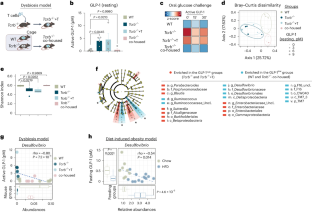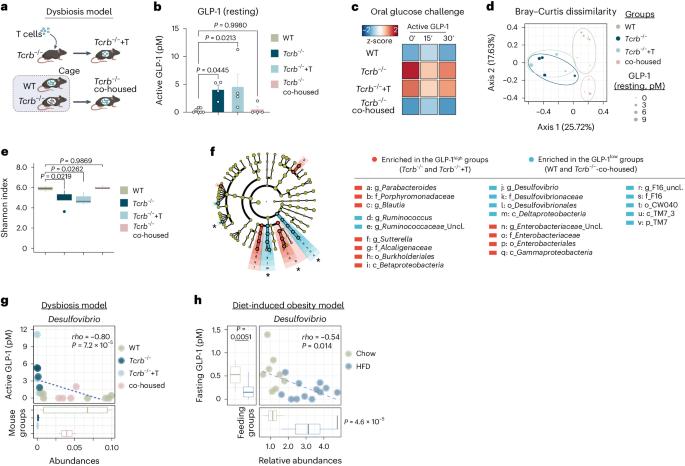Hydrogen sulfide produced by the gut microbiota impairs host metabolism via reducing GLP-1 levels in male mice
IF 18.9
1区 医学
Q1 ENDOCRINOLOGY & METABOLISM
引用次数: 0
Abstract
Dysbiosis of the gut microbiota has been implicated in the pathogenesis of metabolic syndrome (MetS) and may impair host metabolism through harmful metabolites. Here, we show that Desulfovibrio, an intestinal symbiont enriched in patients with MetS, suppresses the production of the gut hormone glucagon-like peptide 1 (GLP-1) through the production of hydrogen sulfide (H2S) in male mice. Desulfovibrio-derived H2S is found to inhibit mitochondrial respiration and induce the unfolded protein response in intestinal L cells, thereby hindering GLP-1 secretion and gene expression. Remarkably, blocking Desulfovibrio and H2S with an over-the-counter drug, bismuth subsalicylate, improves GLP-1 production and ameliorates diet-induced metabolic disorder in male mice. Together, our study uncovers that Desulfovibrio-derived H2S compromises GLP-1 production, shedding light on the gut-relayed mechanisms by which harmful microbiota-derived metabolites impair host metabolism in MetS and suggesting new possibilities for treating MetS. The intestinal symbiont Desulfovibrio, which is enriched in individuals with metabolic syndrome, is found to suppress the production of GLP-1 in male mice. The over-the-counter drug bismuth subsalicylate inhibits the effect of Desulfovibrio and restores GLP-1 levels.


肠道微生物群产生的硫化氢会通过降低雄性小鼠体内的 GLP-1 水平来损害宿主的新陈代谢。
肠道微生物群失调与代谢综合征(MetS)的发病机制有关,并可能通过有害代谢物损害宿主的新陈代谢。在这里,我们发现代谢综合征患者体内富含的一种肠道共生菌--脱硫弧菌会通过产生硫化氢(H2S)来抑制雄性小鼠体内肠道激素胰高血糖素样肽 1(GLP-1)的产生。研究发现,脱硫弧菌产生的 H2S 会抑制线粒体呼吸,诱发肠道 L 细胞的未折叠蛋白反应,从而阻碍 GLP-1 的分泌和基因表达。值得注意的是,用一种非处方药物--亚水杨酸铋来阻断脱硫弧菌和 H2S,可以改善 GLP-1 的分泌,并改善饮食引起的雄性小鼠代谢紊乱。总之,我们的研究揭示了脱硫弧菌产生的 H2S 会损害 GLP-1 的产生,从而揭示了有害微生物群衍生代谢物损害 MetS 宿主代谢的肠道相关机制,并为治疗 MetS 提出了新的可能性。
本文章由计算机程序翻译,如有差异,请以英文原文为准。
求助全文
约1分钟内获得全文
求助全文
来源期刊

Nature metabolism
ENDOCRINOLOGY & METABOLISM-
CiteScore
27.50
自引率
2.40%
发文量
170
期刊介绍:
Nature Metabolism is a peer-reviewed scientific journal that covers a broad range of topics in metabolism research. It aims to advance the understanding of metabolic and homeostatic processes at a cellular and physiological level. The journal publishes research from various fields, including fundamental cell biology, basic biomedical and translational research, and integrative physiology. It focuses on how cellular metabolism affects cellular function, the physiology and homeostasis of organs and tissues, and the regulation of organismal energy homeostasis. It also investigates the molecular pathophysiology of metabolic diseases such as diabetes and obesity, as well as their treatment. Nature Metabolism follows the standards of other Nature-branded journals, with a dedicated team of professional editors, rigorous peer-review process, high standards of copy-editing and production, swift publication, and editorial independence. The journal has a high impact factor, has a certain influence in the international area, and is deeply concerned and cited by the majority of scholars.
 求助内容:
求助内容: 应助结果提醒方式:
应助结果提醒方式:


